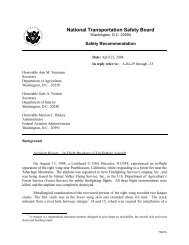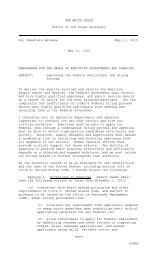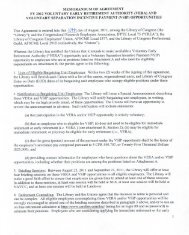Report - Government Executive
Report - Government Executive
Report - Government Executive
Create successful ePaper yourself
Turn your PDF publications into a flip-book with our unique Google optimized e-Paper software.
intelligence component would do so. Although the combat support agencies (DIA, DSS, NGA,<br />
NSA, NRO) established DCIPS PMOs, the military services did not.<br />
The OUSD(I) budget includes a DCIPS line item; approximately three positions, with contract<br />
support, have responsibility for DCIPS design and implementation at the OUSD(I) level.<br />
Without a centralized PMO to direct the effort, however, oversight of component implementation<br />
has been inadequate. OUSD(I) officials concurred that oversight has been lacking and that they<br />
relied on each component’s self-assessment of readiness to implement. As a result, they have<br />
not been able to verify whether adequate training has taken place or whether the components<br />
fully understand the required change management.<br />
In addition, some intelligence components made changes to DCIPS without OUSD(I)’s prior<br />
approval or knowledge. As examples, DIA made significant changes to the performance<br />
evaluation tool and NSA decided to rename DCIPS as “ACE.” Component-specific<br />
modification undermines the goal of creating a unified personnel system across the agencies.<br />
Finally, OUSD(I) staff responsible for implementing DCIPS have extensive backgrounds in HR,<br />
but they have little change management experience. Similarly, the military services, which did<br />
not establish PMOs, experienced challenges with adequate staffing, resources, and authority for<br />
implementation.<br />
Finding 4-3<br />
The lack of an OUSD(I) DCIPS PMO has resulted in OUSD(I)’s inability to provide adequate<br />
oversight of DoD intelligence component readiness and implementation.<br />
Governance<br />
Governance entails establishing processes to resolve conflicts and make decisions. OUSD(I) has<br />
them in place at two levels: the Defense Intelligence Human Resources Board (DIHRB) and<br />
DCIPS Working Group.<br />
Established in 2006, the DIHRB is responsible for addressing and providing recommendations to<br />
the USD(I) on human capital issues, including DCIPS. It is composed of a Defense Intelligence<br />
Senior <strong>Executive</strong> Service or equivalent official from each intelligence component, the DoD<br />
office of General Counsel, and Director of Administration and Management. The DIHRB is cochaired<br />
by designees of the USD(I) and the Under Secretary of Defense (Personnel & Readiness)<br />
(USD(P&R)). 116 When the DIHRB is unable to reach consensus, the USD(I) decides the matter.<br />
The DCIPS Working Group, composed of OUSD(I) HCMO staff and HR representatives from<br />
the intelligence components, is responsible for developing and updating personnel policies,<br />
reviewing and commenting on the design of tools to support DCIPS, serving as a liaison between<br />
116 DoD Intelligence Human Capital Management Operations, Department of Defense Instruction 3115.11, Jan. 22,<br />
2009, pp. 5-7.<br />
65













